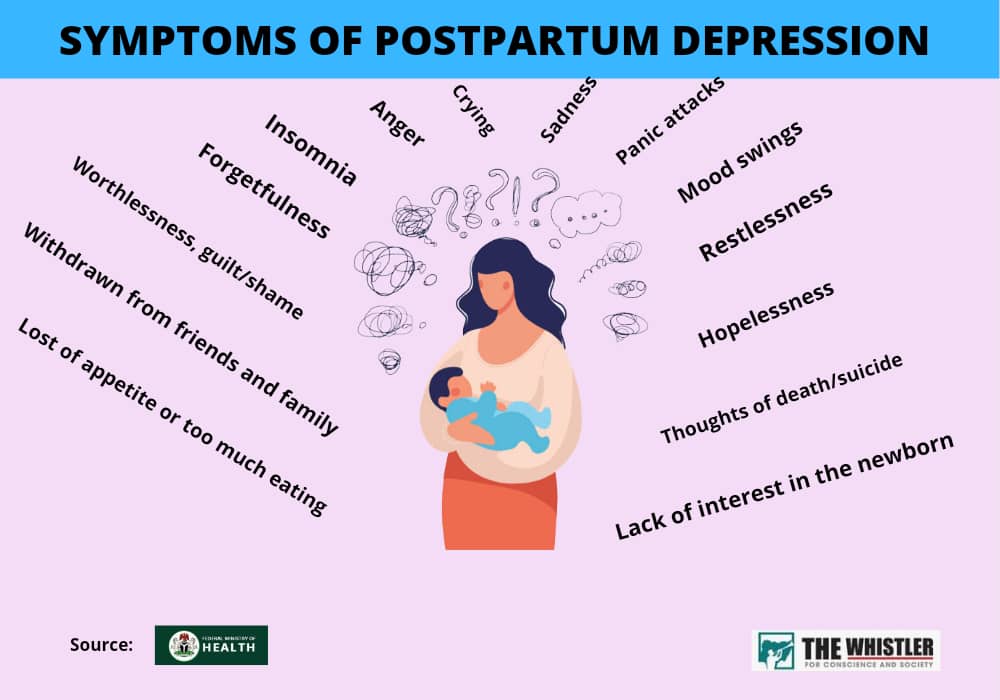Experienced midwives and other medical personnel know what it means when a pregnant woman or nursing mother has regular mood swings or become irritated at the sight of their baby. Or when a nursing mother simply feels empty and helpless. Those are signs of what is called: Postpartum Depression.
It simply means depression after childbirth that some women go through for different reasons. Midwives who discussed the syndrome with THE WHISTLER have explained the cause and symptoms of the sickness.
Advertisement
A senior nurse at the Federal Medical Centre, Jabi, Abuja, Chidinma Okoye, said Postpartum depression occurs after delivery for some patients due to past mental problems or other unfavourable circumstances around them.
She said, “It happens at home when they might have been discharged from the hospital. So many things might trigger it for them at home. Most of the time, they don’t spend much time in the hospital, sometimes they spend 2 to 5 days in the hospital depending on the nature of the delivery. Some with serious cases can spend more than that. Sometimes it’s when they are readmitted that you see the signs.
“Sometimes when the patient’s relatives fail to attend to them or do what they want, they unleash their anger on them. Pressure can also trigger it.
“Generally, every postpartum mother has a tendency for hyper attitude, so if it’s not managed properly by the patient, it can lead to postpartum depression. Also, a patient that has a disease leading to that mental effect can trigger it too. During this period, anything done by the husband or relative that angers that patient can lead to another effect called mental disorder which can easily trigger depression.”
Advertisement
Eunice, a midwife in the Postnatal unit of the FMC, also said it can occur in pregnant women, especially if its hereditary or if they’re going through financial and other challenges.

“It can also occur in pregnant women; it may be hereditary. If they have a history of mental illness in their family, when they are pregnant it manifests. We have what we call mental puerperal psychosis. It occurs in some women, maybe 1/10. Not so common. So, women with such history under any little stress falls into this puerperal psychosis. What we do in the hospital is take the history of the parents to know if they have puerperal psychosis, and we start giving them drugs,” she said.
Giving insight into how some patients manifest the illness, Okoye said: “Mood swings. Some of them may even show some signs in the hospital. How we know is that sometimes when it’s time to attend to them during the ward rounds, they will say no, no, I don’t want you to attend to me, I’m tired, I don’t want to take drugs and some other little things like that. And this is the hyperactive attitude I’m talking about.
“Some danger signs include: when the mother cannot recognise her baby; she doesn’t want to attend to the cry of the baby; or she may even have the danger sign of trying to wound the baby using some sharp objects readily available if the baby continues to disturb.”
Advertisement
Okoye recalled an extreme case in 2019 when one of her patients developed Postpartum depression after delivery and discharge from the hospital.
“She had a prolonged labour and had an emergency Caesarean Section. After 5 days she was discharged. A week or two later on, she came back with postpartum depression. In her own case, her baby was not in danger, but she was not recognising the baby, her husband and even her family members. She didn’t even want to feed the baby. That’s the only case I can say I nursed. “
On how to treat the problem, she said the first thing is to find out the cause of the depression in order to know how to tackle it. “If it’s a financial constraint, social welfare officers can be invited to raise funds through churches and mosques to tackle that. If it is teenage rape, the child can be taken to orphanage homes where they can be taken care of and the mother goes back to school.”
Professor Sunday Samuel Ifah, a Social Psychologist at the Department of Sociology, Nasarawa State University, Keffi, said most women get the “baby blues,” or feel sad or empty, within a few days of giving birth, but the feeling goes away in 3 to 5 days.
“If your baby blues don’t go away or you feel sad, hopeless, or empty for longer than 2 weeks, you may have postpartum depression. Feeling hopeless or empty after childbirth is not a regular or expected part of being a mother,” he explained.
He said Postpartum depression is a serious mental illness that involves the brain and affects the victim’s behaviour and physical health. He said the feeling could make the victim to “feel unconnected to your baby, as if you are not the baby’s mother, or you might not love or care for the baby. These feelings can be mild to severe.”
Advertisement
He said the risk factors for an onset of depression during pregnancy include, history of depression or substance abuse; family history of mental illness and lack of support from family and friends. He added that it occurs more commonly in adolescent females, mothers who deliver premature infants, and women living in urban areas.
Dr Yakubu Anthony, a Gynaecologist at Modibbo Adama University Teaching Hospital, Yola also said there are no known causes of the depression. “But it has risk factors. They are found in women who get pregnant and are not married, or women who give birth and have no relative to help them out and women that already have history of psychiatric problems,” he said.
Dr Anthony said the illness could affect the newborn if not managed properly. He said, “Of course it has effect on the newborn baby, sometimes the mother may want to transfer all her problems to the newborn by neglecting him/her, not taking care of the child, or may want to even inflict some bodily harm on the child.”
He said symptoms of Postpartum Depression include mood swings, frequent crying, feeling overwhelmed or hopeless, iincrease in anger, feelings of anxiety or guilt, and restlessness.
On how to prevent the illness, he said families should enlist good support and prepare very well before and during childbirth.



